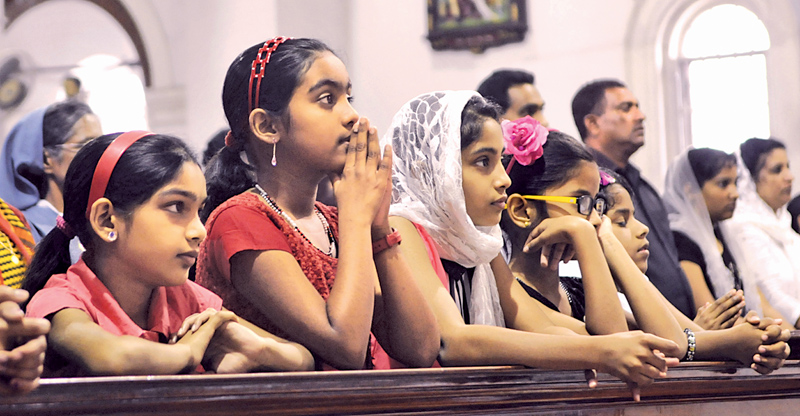Our people congregate in religious shrines. They are instructed, taught, advised, exhorted and counseled by religious leaders. The people listen to them, heed their advice and follow their guidance. The religious leaders who are most listened to are those who relate to people, have a sympathetic ear, who give just and unbiased advice appropriate to the person and/or the situation.
As their wise counsels are invariably followed they are also influential and most respected. They bring about tranquility and serenity into an atmosphere that could turn out to be problematic and confusing. Instead their calm intervention diffuses deep sorrow, brings about community reconciliation, peace and unity in diversity. It is indeed their mission; they have given themselves to an obligation of living with equanimity and bringing good order and serenity to the community as a natural outcome of their own way of life. Religious leaders are able to promote reconciliation, unity and peace in the present day Sri Lankan society; they are indeed in a very advantageous position to do so.
Failure of religions or religious leaders?
Unfortunately some religious leaders abdicate and forfeit their exalted position. That is because they themselves, given over to weaker tendencies and contrary to the tenor of their religious status, get entangled in a web of conflicting loyalties. Their sense of truth and justice and the need to uphold genuine respect for the dignity and respect due to all the people of the land and of the world and connect to them all fraternally as elder fellow members of the human family irrespective of their ethnicity, caste, creed and gender, are not strongly grounded in them.
This is also because of their non adherence to their fundamental religious convictions. Their human proclivities are compounded by partisan political propensities and personal loyalties in such a manner as to overpower and subdue their spiritual inclinations. They create confusion. In the place or situation where there should be enlightenment, a darkness comes to prevail due to misunderstanding. This is the reason why at the national level, the number of religious leaders of an impeccable and strong character are few.
It is a sad fact that during the past six decades, in Sri Lanka, religious leaders have tended to be wanting in upholding the very tenets they were expected to defend. The failure of religious leaders was interpreted as a failure of religions rather than their leaders not fulfilling their due role in society.
As a result religious leaders have not only been disregarded, they are held in veiled contempt by the people who do not at times hesitate to show in various ways their dissonance with such religious leaders or demonstrate even their contempt of them openly in various ways. They have lost their credibility.
It should never be so. The experience of Sri Lanka since Independence, the problems she has encountered which the secular leaders have badly handled, the traumas the people have gone through as a result, the sufferings they have endured, the tragedies they have faced, the losses to life and property they have suffered, should have made the religious leaders socially sensitive, anxious and spiritually wiser than the rest of those in public life.
Building mutual trust
The people always live in an actual socio-economic, religio-cultural, political situation. In social and political reality the people were in – the creation of myopic, greedy and self-absorbed politicians – the Religious Leaders themselves lost clarity of vision, failed to correctly understand the social confusion created by politicians implementing their contradictory political ideologies. They did not have the courage to call them to sanity or insist on appropriate solutions.
Today the various circumstances seem to have compelled the Religious Leaders to meet one another and come to a better understanding than before. As recent events have shown, they are ready and able to come together, exchange views and engage in dialogue. They are able to acknowledge the right of independent existence and identity of the different ethnic and religious communities and accord to each other mutual respect.
There is a growing concern among them for the marginalized, the voiceless and the poor of whatever community they belong to. They wish to ensure that there is freedom and space for human solidarity and fraternity to grow. And all are concerned about the social relationships and human rights that should animate the national community. If they were to come together more often and open themselves to one another frankly and sincerely, their mutual comprehension will be beneficial to all the people of Sri Lanka.
It is a great blessing that courageous Religious Leaders who speak for all the people are not altogether absent in our Land. Their coming together will certainly build up mutual trust and respect. The more they renounce their sense of ‘self’ and adhere to the noblest principles of religion, they become embodiments of reason and wisdom and examples of virtuous living. They will be able to summon other leaders in society to work together for the well being and common good of all.
They could challenge them to integrity, candor and transparency of life, never to usurp political power to trample on the human dignity of any of the citizens of this Country and never to amass wealth by anti-social means to the detriment of the people the majority of whom are humble workers and wage earners.
If the religious leaders transcend partisan political affiliations and work for truth, justice and uphold human dignity, honour, autonomy, fraternity and solidarity, they would make an enormous contribution to bring about a highly acceptable level of social harmony and community bonding in Sri Lanka. It is necessary to transform peoples’ lives from a chaotic, miserable and meaningless one to a contented, happy and meaningful one. This is the aspiration of all the people and the Religious Leaders should be able to fulfill them.



Add new comment